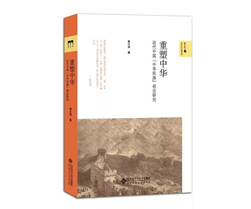
. > WHAT'S NEW > BOOKS
Origins and formation of the 'Chinese nation'
Author : XU XIAOQING Source : Chinese Social Sciences Today 2018-01-25

Reshaping China: Studies on the Modern Concept of the Chinese Nation
Author: Huang Xingtao
Publisher: Beijing Normal University Press
The spread and identification of the concept of the “Chinese nation” is a core political concept and social cultural phenomenon in modern China. It profoundly reflects the political and cultural spirit of China as well as its destiny. Reshaping China elaborates on the history of the brewing, establishment, spread, enforcement and popularization of the “Chinese nation” concept from the Qing Dynasty to the anti-Japanese war period. This history not only influenced the historical course of China since the 20th century, but will also continue to affect the future development of China.
The “Chinese nation” is quite a new term, not emerged until modern China. Yet, it is the most important “basic concept” in modern Chinese political society. When did “China” become a country of modern significance? Huang argued that “China” was the national name of the dynasties throughout history, and the name “China” as a country of modern significance was reshaped in the late Qing Dynasty. The important role of the Qing Dynasty in shaping the name should not be neglected. That the “Republic of China” was still short for “China” is also a historical continuation of this unique political tradition. Although the concept of the “Chinese nation” was put forward at the beginning of the 20th century, the formation of the modern concept of the Chinese nation in the complete sense was established only after the 1911 Revolution broke out. The fact that the “Han nationality” was replaced by the “Chinese nation” is not just a matter of national appellation, but also a change in perception. It is a historical, continuous, integrated and open view of the formation and development of China’s main ethnic group.
In the study of the concept of the “Chinese nation,” Huang explores the symbols, metaphors, imagination, rituals and mentality behind the concept and revealed the significance of national consciousness and identity of modern Chinese people. The history of the concept lies in the interaction and integration of the traditional cultural and political resources of “China” and the modern ideological and political resources of the “nation.” Thus the “Chinese nation” realized its continuation of traditions and modern transformation.
At the same time, Huang examined the concept of the “Chinese nation” in the classical works of modern Chinese thinkers, such as Liang Qichao, Li Dazhao and Sun Yat-sen since the late Qing Dynasty. He pointed out that Liang Qichao not only created the concept of “big nation” but also probably started using the term “Chinese nation” as early as 1902.
In addition, Huang examined a large amount of historical materials, including the national flag, national anthem, national titles, architecture, rituals, encyclical approval, approval, funeral oration, inscriptions, songs, drama, radio, calligraphy and advertising, and analyzed their functions in the acceptance and spread of the concept of the “Chinese nation” among the general public. In particular, Huang was the first to systematically study the Datong Newspaper cocreated by Wu Zesheng, a Manchu student who studied in Japan in the Qing Dynasty, and found that the newspaper is an important resource of the “Chinese nation” concept.
Ye Shengtao made Chinese fairy tales from a wilderness
Ye Shengtao (1894–1988) created the first collection of fairy tales in the history of Chinese children’s literature...
-
How northern ethnicities integrated into Chinese nation
2023-09-18
-
Mogao caves
2023-09-12
-
Mogao Grottoes as ‘a place of pilgrimage’
2023-09-12
-
Time-honored architectural traditions in China
2023-08-29
-
Disentangling the civilizational evolution of China
2023-08-28
-
AI ethics in science fiction
2023-08-23













 2011-2013 by www.cssn.cn. All Rights Reserved
2011-2013 by www.cssn.cn. All Rights Reserved